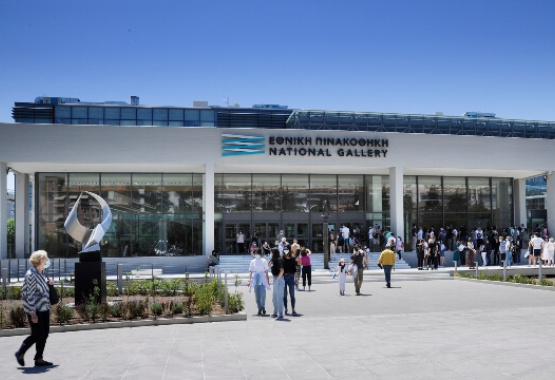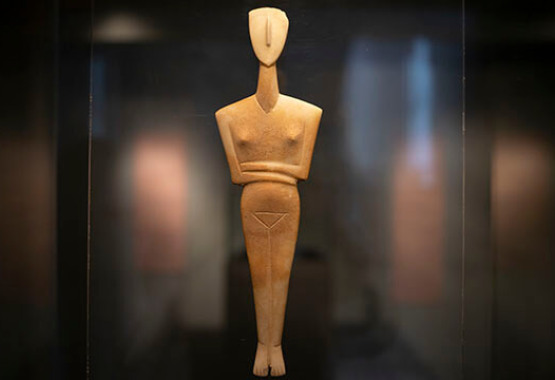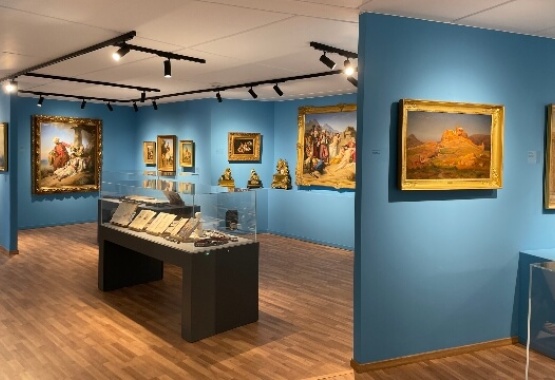
ATHENS
Founded on the walls of ancient Athens, the Benaki Museum of Islamic Art houses a celebrated collection of ceramics, metalwork, textiles, jewellery and other works of art from across the Islamic world. It hosts temporary exhibitions and on the top floor a cafe with a breathtaking view over the archaeological site of Keramikos.
Antonis Benakis initially started collecting in Egypt at the beginning of the 20th century. At the same time many similar collections were created in Europe and America, which, in many cases, complement the Benaki Museum collection.
The complex comprises a three-storey house and a two-storey house, the facades of which were listed in 1989.
The Benaki Museum collection of Islamic art, ranks among the most important in the world. It includes examples of all its local variations from as far as India, Persia, Mesopotamia, Asia Minor, the Middle East, Arabia, Egypt, North Africa, Sicily and Spain.
The evolution of Islamic civilisation from the first appearance of Islam up to the Ottoman period and the corresponding development of Islamic art up to the 19th c. are demonstrated by more than 8,000 works of art, including ceramics, gold, metalwork, textiles and glass, smaller groupings of bone objects, inscribed funerary steles and weaponry, as well as the marble-faced interior of a reception room from a 17th-century Cairo mansion. The two carved wooden memorial door panels from 8th century Mesopotamia rank amongst the more important objects in the collection, as do the unique reed wat from 10th -century Tiberias, the small brass box bearing the signature of Ismail ibn al-Ward al-Mausili dated 1200, the bronze astrolabe of Ahmad ibn al-Sarraj dated 1328/29, and the famous 16th century velvet saddle from Bursa.
The Islamic Art collections are exhibited in the Museum of Islamic Art, housed in the neo-classical building complex that was donated by Lambros Eftaxias. It is located in the historic centre of Athens, near the ancient Kerameikos cemetery.
Benaki Museum of Islamic Art
An islamic collection in the heart of Athens
AS OF OCTOBER 14, 2024, THE MUSEUM WILL REMAIN CLOSED TO THE PUBLIC.Founded on the walls of ancient Athens, the Benaki Museum of Islamic Art houses a celebrated collection of ceramics, metalwork, textiles, jewellery and other works of art from across the Islamic world. It hosts temporary exhibitions and on the top floor a cafe with a breathtaking view over the archaeological site of Keramikos.
Antonis Benakis initially started collecting in Egypt at the beginning of the 20th century. At the same time many similar collections were created in Europe and America, which, in many cases, complement the Benaki Museum collection.
The complex comprises a three-storey house and a two-storey house, the facades of which were listed in 1989.
The Benaki Museum collection of Islamic art, ranks among the most important in the world. It includes examples of all its local variations from as far as India, Persia, Mesopotamia, Asia Minor, the Middle East, Arabia, Egypt, North Africa, Sicily and Spain.
The evolution of Islamic civilisation from the first appearance of Islam up to the Ottoman period and the corresponding development of Islamic art up to the 19th c. are demonstrated by more than 8,000 works of art, including ceramics, gold, metalwork, textiles and glass, smaller groupings of bone objects, inscribed funerary steles and weaponry, as well as the marble-faced interior of a reception room from a 17th-century Cairo mansion. The two carved wooden memorial door panels from 8th century Mesopotamia rank amongst the more important objects in the collection, as do the unique reed wat from 10th -century Tiberias, the small brass box bearing the signature of Ismail ibn al-Ward al-Mausili dated 1200, the bronze astrolabe of Ahmad ibn al-Sarraj dated 1328/29, and the famous 16th century velvet saddle from Bursa.
Coffee shop
The museum’s traditional coffee shop faces the archaeological site of the Kerameikos cemetery, Thiseion and the Acropolis. Have your lunch or coffee break here and enjoy the food which bears Arabic influences, matching the surroundings.The Islamic Art collections are exhibited in the Museum of Islamic Art, housed in the neo-classical building complex that was donated by Lambros Eftaxias. It is located in the historic centre of Athens, near the ancient Kerameikos cemetery.




